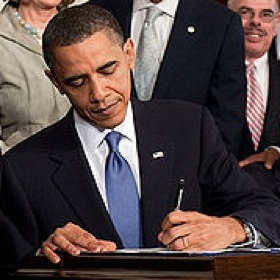'Monsanto Protection Act' Signed Into Law By President Obama
The Monsanto Protection Act, more formally known as the Farmer Assurance Provision, is a policy item that directly benefits the billion-dollar corporation, which took an active part in penning it. On Thursday, President Barack Obama signed the spending bill that contains the contentious provision into law.
There are many reasons why food and consumer advocates, as well as organic farmers, are finding the legislation troublesome. Most notably, there is the issue of the main corporation it serves to benefit that gives the act its fitting moniker – but there’s more.
The “Monsanto Protection Act” will make the federal courts unable to halt production of genetically modified (GMO) or genetically engineered (GE) seeds. The provision would even cover seeds that are later proven to provide health risks. The Monsanto Company is a titan in the GMO industry.
In fact, the Monsanto Company worked hand-in-hand with lawmakers to craft the language of the bill. Sen. Roy Blunt took the lead on the provision that will permit Monsanto to continue selling their GMO seeds, which can then be planted. If they are found to be harmful at a later point in time, no legal precedent will exist to stop them.
The spending bill that contains the provision is called HR 933. Many members of Congress voted on the bill without knowing about the Farmer Assurance Provision’s existence. The bill as a whole is intended to avoid a government shutdown, and allow the government to continue running without the need for furloughs or lapses in bill payment.
President Obama quietly signed HR 933, and with it the “Monsanto Protection Act” into law last week. Two hundred and fifty thousand people have signed an online petition against it, and members of Food Democracy Now protested in front of the White House to no avail.
RELATED ARTICLES
Get the most-revealing celebrity conversations with the uInterview podcast!








Leave a comment